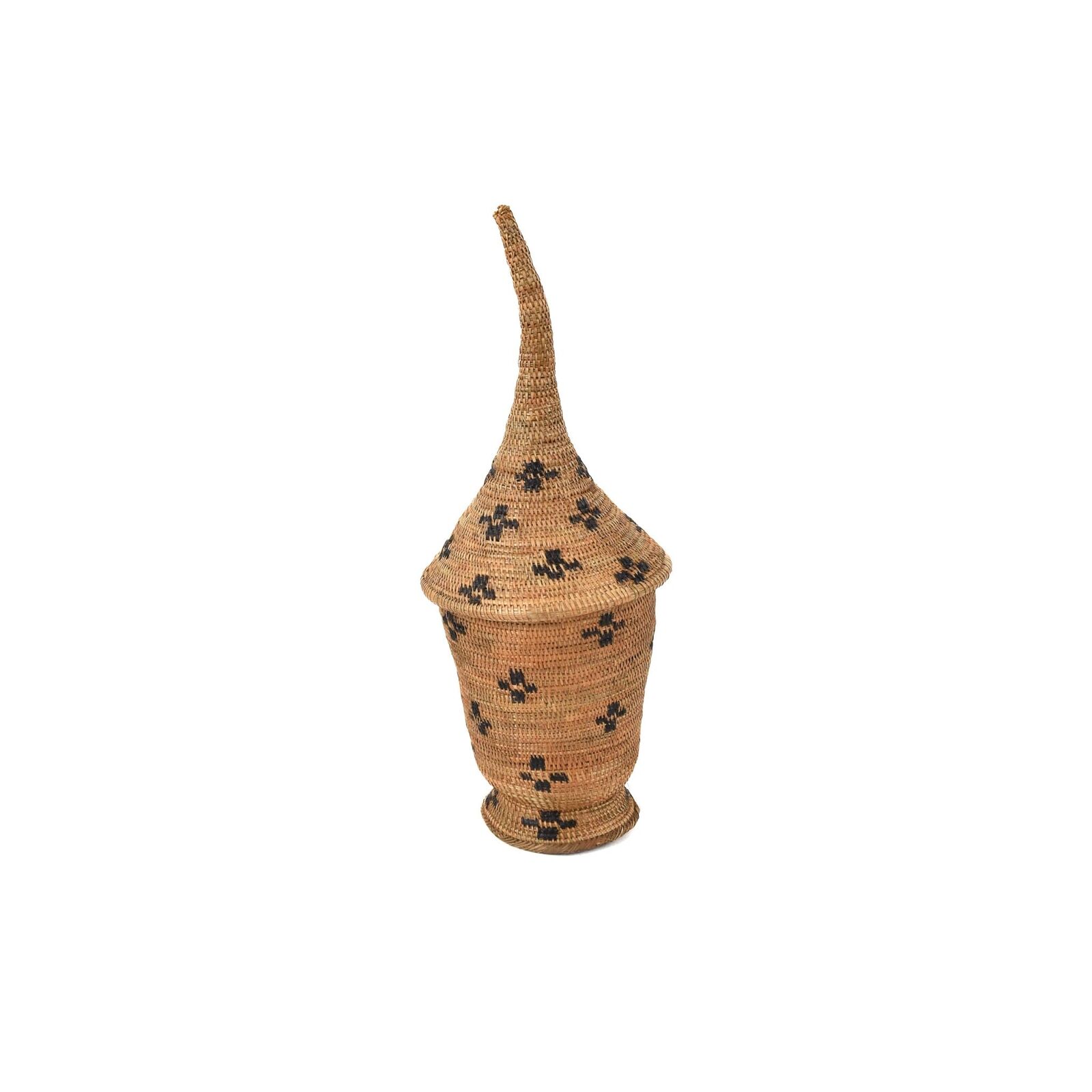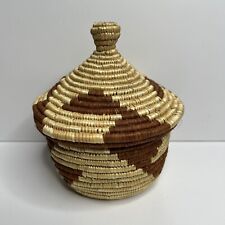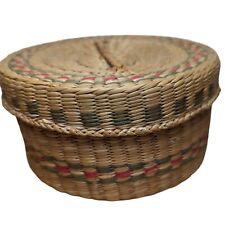Small Handwoven Old Lidded Tutsi Basket Rwanda For Sale

When you click on links to various merchants on this site and make a purchase, this can result in this site earning a commission. Affiliate programs and affiliations include, but are not limited to, the eBay Partner Network.
Small Handwoven Old Lidded Tutsi Basket Rwanda:
$166.00
Small Handwoven Old Lidded Tutsi Basket RwandaLidded baskets such as this are among the most exquisite artworks made by the Tutsi or by people of other ethnic groups, including Hutu and Twa people. The Tutsi (Watutsi or Watusi) people live mainly in Rwanda and Burundi alongside the Hutu and the Twa with whom they share similar cultures and speak the same language, the Kinyaruanda. According to oral tradition, the Tutsi were originally cattle herders and Nilotic who moved south from Ethiopia and conquered the homeland of the Hutu about 600 hundred years ago. Despite their small number, the Tutsi managed to impose a new social political structure based on a Lord-Vassal relationship with the Hutu. Until the colonial period, Tutsi Mwami (King) ruled the Tutsi as well as the Hutu and Twa. During this period, Germans and then Belgians limited the authority of the Mwami and regulated the relationship between Tutsi, Hutu and Twa. Traditional art of Rwanda and Burundi is usually represented by basketry, pottery, metalworking and Jewelry. Little is known about their sculpture. The Tutsi excel in producing these beautiful miniature lidded baskets, which become symbols of the Tutsi culture. These baskets called Agaseki were made from vegetable fibers of sisal and papyrus trees (Nigwegwe). The grasses of these trees were soaked in the water for almost two weeks to make them soft. Then they were beaten with stones and dried. Earlier examples like this were made of the natural pale gold color of the fibers decorated with the patterns in black which came from boiling the root and seeds of the Urukamgi plant or the banana flowers. Recent examples incorporate imported dyes including red, green, orange, and mauves. The range of the patterns is unlimited and shows the creativity of women from Rwanda and Burundi. Many of these designs have specific names. These baskets were used as containers to transport valued foods such as eggs, milk, beans, meat, and other valuable objects. They were presented as wedding gifts to a bride and groom. They were also used as decoration. After the genocide of 1994, the miniature baskets have became symbols of peace, as Hutu, Tutsi, and Twa women sit side by side to weave the “peace baskets”. They have new designs and are more colorful compared to these earlier examples. Also, the straw used for these new baskets is thicker than the traditional ones. Small Handwoven Old Lidded Tutsi Basket Rwanda Lidded baskets such as this are among the most exquisite artworks made by the Tutsi or by people of other ethnic groups, including Hutu and Twa people. The Tutsi (Watutsi or Watusi) people live mainly in Rwanda and Burundi alongside the Hutu and the Twa with whom they share similar cultures and speak the same language, the Kinyaruanda. According to oral tradition, the Tutsi were originally cattle herders and Nilotic who moved south from Ethiopia and conquered the homeland of the Hutu about 600 hundred years ago. Despite their small number, the Tutsi managed to impose a new social political structure based on a Lord-Vassal relationship with the Hutu. Until the colonial period, Tutsi Mwami (King) ruled the Tutsi as well as the Hutu and Twa. During this period, Germans and then Belgians limited the authority of the Mwami and regulated the relationship between Tutsi, Hutu and Twa.
Traditional art of Rwanda and Burundi is usually represented by basketry, pottery, metalworking and Jewelry. Little is known about their sculpture. The Tutsi excel in producing these beautiful miniature lidded baskets, which become symbols of the Tutsi culture. These baskets called Agaseki were made from vegetable fibers of sisal and papyrus trees (Nigwegwe). The grasses of these trees were soaked in the water for almost two weeks to make them soft. Then they were beaten with stones and dried. Earlier examples like this were made of the natural pale gold color of the fibers decorated with the patterns in black which came from boiling the root and seeds of the Urukamgi plant or the banana flowers. Recent examples incorporate imported dyes including red, green, orange, and mauves. The range of the patterns is unlimited and shows the creativity of women from Rwanda and Burundi. Many of these designs have specific names. These baskets were uséd as containers to transport valued foods such as eggs, milk, beans, meat, and other valuable objects. They were presented as wedding gifts to a bride and groom. They were also uséd as decoration. After the genocide of 1994, the miniature baskets have became symbols of peace, as Hutu, Tutsi, and Twa women sit side by side to weave the ‚Äúpeace baskets‚Äù. They have new designs and are more colorful compared to these earlier examples. Also, the straw uséd for these new baskets is thicker than the traditional ones.
Buy now and save! Tell a friend Visit store Watch now Postage info
Click the Postage tab above the listing description for more info
Click the Postage tab above the listing description for more info!
Additional delivery notesPICK UP OPTION
Sorry, our items are NOT available for pick-up.
PAYING VIA PAYPALWe accept PayPal on our all our items so you can shop with confidence.
Simple choose the PayPal option when proceeding through the checkout.
Additional InformationNo additional information at this time
Ask seller a question
You might also like Amarro Arussi Leather Shield Ethiopia Bamileke Handwoven Honey Basket Cameroon Bògòlanfini Black Mudcloth Textile Mali 52.5x36.5 Inch 3 Brick Red Tabular Venetian Trade Beads Loose ContactTo contact our Customer Service Team, simply click the button here and our Customer Service team will be happy to assist.
Ask seller a question
© My Store
PostageClick the Postage tab above the listing description for more info
PaymentAccepted Payment Methods
- PayPal
Returns are accepted
Items must be returned within 30 days of the sale ending
Buyer will pay for return shipping.
integration by
Related Items:
Small Handwoven Storage Basket / Trinket Box With Lid Natural Fibers
$24.99
Small handwoven seagrass painted color lided handle basket 2 1/2 inch boho
$19.99
Small Handwoven Old Lidded Tutsi Basket Rwanda
$166.00



